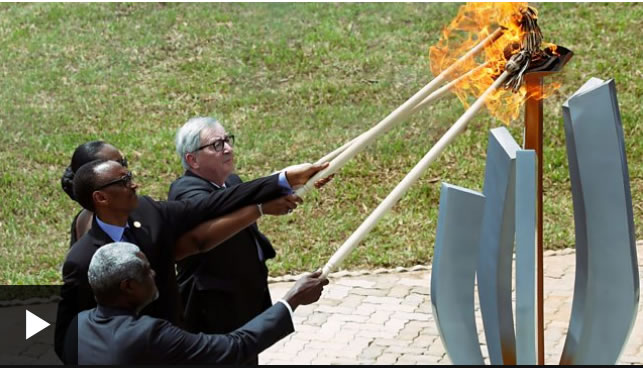Rwanda Genocide: Nation Marks 25 Years Since Mass Slaughter
- Home
- Rwanda Genocide: Nation Marks 25 Years Since Mass Slaughter

Rwanda Genocide: Nation Marks 25 Years Since Mass Slaughter

Commemorations have begun in Rwanda to mark the 25th anniversary of the genocide that killed about a tenth of the population.
The country will mourn for 100 days, the time it took in 1994 for 800,000 Rwandans to be massacred.
Most were minority Tutsis, killed by ethnic Hutu extremists.
President Paul Kagame, who led the rebel force that ended the genocide, lit a remembrance flame at the memorial in the capital, Kigali.
How is Rwanda remembering?
The commemoration activities began with the flame-lighting ceremony at the memorial, where about 250,000 victims are said to be buried. The flame will burn for 100 days.
The 61-year-old president, who has led the country since the end of the genocide, then delivered a speech at the Kigali Convention Centre.
He said the resilience and bravery of the genocide survivors represented the “Rwandan character in its purest form”.
“In 1994, there was no hope, only darkness. Today, light radiates from this place. How did it happen? Rwanda became a family once again,” Mr Kagame said.
President Paul Kagame has lit the flame of Remembrance assisted by a generation of 25 years at the @Kigali_Memorial. The flame will burn for the next 100 days for the 25th commemoration of the 1994 Genocide Against the Tutsi. #Kwibuk25 pic.twitter.com/SVKOsSvjyu
— Kwibuka Rwanda (@KwibukaRwanda) April 7, 2019
The president said the events had made the country more united.
“The fighting spirit is alive in us. What happened here will never happen again,” he said.
Mr Kagame will later lead a vigil at the Amahoro National Stadium, which was used by United Nations officials to try to protect Tutsis during the killings.
Who is attending?
A number of foreign leaders are in the country for the events. They are mainly African, although Prime Minister Charles Michel will represent the former colonial ruler, Belgium.
French President Emmanuel Macron will not be there. This week he appointed a panel of experts to investigate France’s role in the genocide.
France was a close ally of the Hutu-led government prior to the massacres and has been accused of ignoring warning signs and training the militias who carried out the attacks.
France will be represented by Herve Berville, a Rwandan-born MP.
Ugandan President Yoweri Museveni will also not be there. He has been accused of backing Rwandan rebels who oppose Mr Kagame.
The vast number of people attending are ordinary Rwandans, including those who lived through the slaughter.
Olive Muhorakeye, 26, told Reuters: “Remembering is necessary because it’s only thanks to looking back at what happened [can we] ensure that it never happens again.”
How did the genocide unfold?
On 6 April 1994, a plane carrying then-President Juvenal Habyarimana – a Hutu – was shot down, killing all on board.
Hutu extremists blamed the Tutsi rebel group, the Rwandan Patriotic Front (RPF). It denied the accusation.
In a well-organised campaign of slaughter, militias were given hit lists of Tutsi victims. Many were killed with machetes in acts of appalling brutality.
One of the militias was the ruling party’s youth wing, the Interahamwe, which set up road blocks to find Tutsis, incited hatred via radio broadcasts and carried out house to house searches.
Source: BBC
Classic Ghana
Classic Ghana brings you into a fun world of arts, entertainment, fashion, beauty, photography, culture and all things in between. Let’s explore these together!


